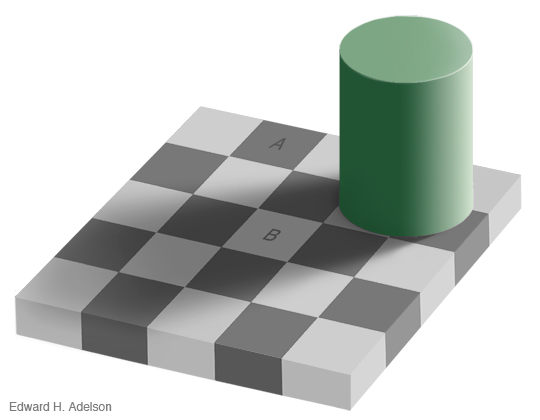
Psychology 333
Sensation and Perception
Winter 2008
Learning Goals
|
Textbook
|
Exams and Grading |
Quiz Sections |
Course Schedule |
Course Policies |
 |
Psychology 333 Sensation and Perception Winter 2008 |
March 13: I've updated the Final Exam Study Guide
(Chapters 12-15) to cover only the topics you're responsible for.
March 9: Download the ScienceNews article
on Sensory
Substitution with the Tongue here.
March 9: Download the NewYorker article Numbers Guy here.
March 9: Download the NewYorker article Scents and Sensibility here.
March 8: Exam 3 scores are in.
As you guessed, the grades are lower than exams 1 and 2, so I'll
compensate for this by adding 4 points to your score on Exam
3. Your grades for all
the exams, and the average of the
best 2 exams can be downloaded here.
The maximum scores for Exams 1, 2 and 3
were 42, 41 and 45 respectively. Here's an example of how to
calculate your grade point for the best 2 exams:
Suppose you scored 30 on Exam 1, 36 on Exam
2, and 30 on exam 3. Add 4 points to Exam 3's score so your
scores are now
30, 36 and 34. To calculate the grade points divide each score by
the maximum possible, and multiply by 4:
4x30/42 = 2.86, 4x36/41 = 3.51, 4x34/45 =
3.02.
Now, take the best two grade points (exams
2 and 3) and average them: (3.51+3.02)/2 = 3.27. That's
your grade point for your exams, and will consist of 60% of your grade
for the class.
February 28: The exam 3 study sheet has been
updated to include the end of Chapter 7 (Color Vision)
February 26: Download the Motion Induced Blindness movie here.
February 22: Download the MT Direction-Selective Cell
movie here
February 20: Download the Hubel and Wiesel
Binocular Depth Cell movie here
February 18: EXAM 3 will be moved LATER to Monday,
March 3rd. Because of the late notice, I can be more
flexible about providing make-up exams for those who can't make it to
class on this day.
February 17: Exam 2 scores and histograms
are now posted below
January 30: One copy of textbook is
now available on reserve at the library.
January
28: IMPORTANT ANNOUNCEMENT: Due to the snowy
weather, exam 1 will be given tomorrow on TUESDAY, JANUARY 29th.
Material from today's lecture will NOT be covered tomorrow's exam, but
will be
covered in exam 2.
January 24: Lecture notes will be provided
in advance from now on. See link
below
January 23: Download the example questions for Exam 1 here
January 22: Download the study guide for Exam 1 here
January 17: Download the Hubel and Wiesel
movies here:
| On-centered LGN cell |
| V1Simple cell |
| V1 Complex cell |
| V1 Direction selective cell |
January 9: Important Announcement: Quiz sections cancelled for week 1
(due to TA illness)
January 6: For
those students wishing to add this class: The course is currently
full, and I have been asked not to overload this class before the
beginning of the quarter. I have compiled a waiting list based on
the order in which students have contacted me. If you would like
to be added to this list, please send me an email (gboynton@u.washington.edu).
| Time:
|
M T W Th 11:30 - 12:20 pm |
| Location:
|
MGH
241 |
| Sections: |
AA:
11:30 - 12:20 EEB
026 AB: 12:30 - 1:20 EEB 026 |
| Instructor: |
Geoff Boynton |
| Office:
|
Guthrie 233A |
| Office
Hours: |
Mondays:
1:30-3:30 or by appt. |
| email:
|
gboynton@u.washington.edu |
| T.A.: |
Alec
Scharff |
| Office:
|
Chemistry library, Room 130 |
| Office Hours: |
T 9:30-10:30, Th: 4:00-5:00pm |
|
email:
|
scharff@u.washington.edu |
| Exam
1 |
Exam
2 |
Exam
3 |
Final |
|
| Study
Guide |
 |
 |
 |
 |
| Practice
Test |
 |
 |
 |
 |
| Grades |
 |
 |
 |
 |
| Histograms |
 |
 |
 |
 |
| Answer
Sheet (A) |
 |
 |
 |

|
| Answer
Sheet (B) |
 |
 |
 |

|
1. Attendance at
all
lectures is
expected. You will be held responsible for all announcements made
during class
meetings regarding exam scheduling and assignment due dates. I will post announcements to this course
website, but, in general, you’ll get the information soonest if you are
in
class.
2. If you miss
an exam,
you will be given a grade of 0 for that exam. No makeup exams
will be
given unless (1) notice is given to the instructor, in person, by 5
p.m. the
day before the exam, or (2) extenuating circumstances prevail
for which
documentation is available, in the form of an airline ticket receipt,
funeral
notice, etc. (in the case of family emergencies) or a doctor’s case
note (not
an appointment card) for SERIOUS illness/injury. This documentation
MUST be
presented to the instructor, not merely offered. All makeup exams must
be taken
within one week of the missed exam. There are no exceptions to
this
policy.
Important University
Policies
Academic dishonesty:
The
University
of Washington has a set of guidelines on how to respond to suspected
cases of
academic dishonesty, or "cheating." These cases include plagiarism in
written assignments (copying directly from the text or another
student’s work)
and referring to contraband or getting help from someone else in
testing
situations. You should familiarize yourself with these guidelines. As a
student
at the